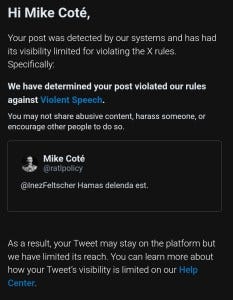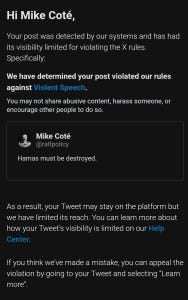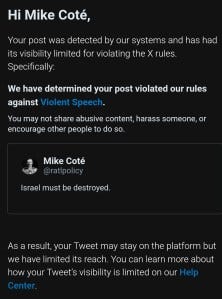A Curious Case of Twitter Censorship
Meet the new boss, same as the old boss.
When Elon Musk purchased the social media platform Twitter in late 2022, we were told that the acquisition would create either a hellhole of despicable rhetoric or a paradise of unfettered free speech, depending on who was doing the talking. The progressive left that had previously held the levers of power on the platform were terrified of a dystopian future of misgendering, hate speech, and electoral interference, while the online right saw Elon as something of a secular savior, restoring the rightful balance of power in discourse. In reality, he is neither. The New Twitter (I refuse to call it X, as I’m not a toddler) is remarkably similar to the Old Twitter, especially in the ways that matter most: censorship of speech. Story time!
A few weeks back, I noticed that one of my posts on Twitter was being “visibility limited,” essentially removing the ability for others – even those who follow me and therefore would probably like to see my tweets – to interact with or view it. In that tweet, I called for the destruction of Hamas as a political and military entity. This is not at all a controversial sentiment; Hamas is a designated foreign terrorist organization by the United States and dozens of other countries, it is a death cult dedicated to genocidal violence, and its annihilation is Israel’s primary war aim in Gaza. It should not be verboten to call for the end of a terrorist entity, whether that is ISIS, al Qaeda, or Hamas. But it seemed to me that Twitter was indeed declaring that sentiment beyond the bounds of reasonable discourse. As time passed, I chalked it up as the product of a random flag, probably from another user who objected to my anti-Hamas position. That is, however, until it happened again.
Just this week, I posted a reply to a tweet about Hamas atrocities with the phrase “Hamas delenda est.” This was visibility limited almost immediately, which I found both odd and humorous. The post was meant to convey what I believe – that Hamas must be destroyed – playing off of the famous Roman orator Cato the Elder, who ended all of his speeches with the phrase “Carthago delenda est,” meaning “Carthage must be destroyed.” The message I received (see above image) stated that (emphasis added) “Your post was detected by our systems and has had its visibility limited for violating…our rules against Violent Speech. You may not share abusive content, harass someone, or encourage other people to do so.” Besides the laughable language around “abusive content” and harassment – we’re talking about a literal terrorist group here – the fact that the post was limited by an automated system was interesting to me. Not only did it find the phrase very rapidly in a random reply I posted, it did so when the phrase itself was in Latin. If you have been on Twitter at all since October 7, you will have seen far more incendiary language used by pro-Palestine activists without any sanction whatsoever.
There seemed to be a double standard at play here. Well, that got me thinking. To find out, I decided to run a bit of a casual experiment; an A/B test, if you will.
To do so, I posted a thread with four separate tweets, all phrased exactly in the same way: “_________ must be destroyed.” To make it fair, I included both “Israel” and “Hamas” as my primary examples, but I added in a couple others for control/fun purposes. “Kale,” which was far better as a decoration on the Pizza Hut buffet line (real 90s kids know) than as a foodstuff, was the control. “Carthage,” Cato’s ancient target, was the secondary control and my in-joke for those who read the thread. I posted those tweets on the morning of March 28, and within a few hours I had my first visibility strike. I’ll let you guess which of those identical messages offended the Twitter censors. (The answer is in the screenshots above.)
More than 24 hours later, I received a second visibility limitation, this time for the tweet including “Israel.” (See screenshots below.) Initially, I was pleasantly surprised to see this tweet receiving the same treatment. There was no bias after all! But I quickly thought a bit more about it and found this strike perplexing. Genocidal propaganda against the Jewish state is commonplace on Twitter, as is blatant antisemitism. Plenty of larger accounts than my own have posted such messages and have had no limitations placed on their tweets. I also found it a bit odd that it took the Twitter “systems” a full day to scan what was quite literally the very next post in the thread it immediately flagged. Automated systems generally don’t work like that, which piqued my suspicions. I do genuinely believe that Twitter is systematically searching for anti-Hamas posts and limiting them, only adding the same treatment for anti-Israel posts after some time has elapsed from their publication.
As of now, it is still totally okay with Twitter’s censors to call for the violent destruction of Carthage – which is still an existing city in modern Tunisia – and one of the world’s trendiest cabbages. I don’t know about you, but I sure feel unsafe thinking about that fact.
Joking aside, my little experiment proves one thing – even if you don’t buy the disparate treatment of anti-Israel and anti-Hamas slogans. It shows that the New Twitter that everyone was either terrified of or supremely excited for is nothing of the sort. It isn’t any worse of a dumpster fire than it was under the old leadership and it’s not at all a free speech utopia where people can openly express their ideas. Not all that much has changed. Unlike Musk, I actually am pretty damn close to being a free speech absolutist. I don’t think any of the tweets I made, or those like them, should be limited or censored. Let a thousand flowers bloom, even those nasty ones that smell like a rotting corpse. I know this is an unpopular position, as nobody likes their own sacred cows spit-roasted over the open flame. But it is the right one for a society composed of liberated individuals, which is what we are and should strive to remain as.
In this circumstance, however, the intrinsic human desire for censorship has won out over the principles that supposedly undergird the social media ideal. As the French would say, plus ça change, plus c’est la même chose.




